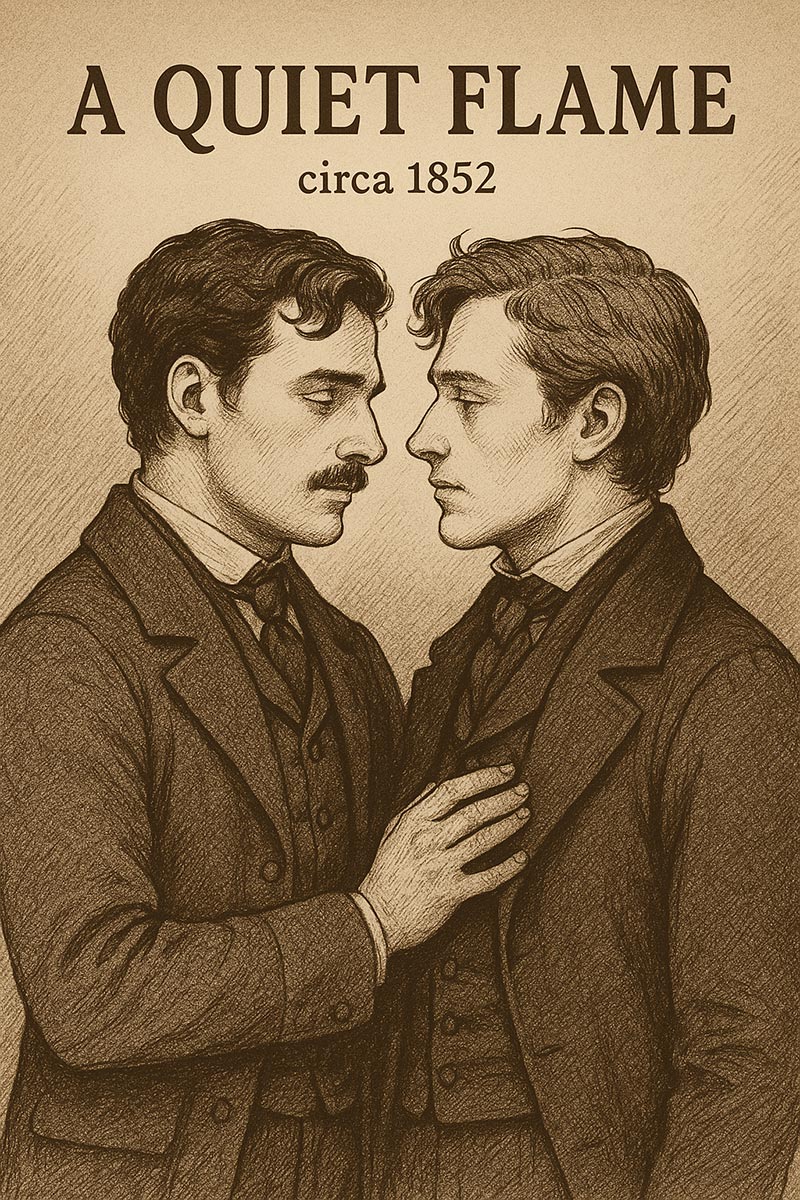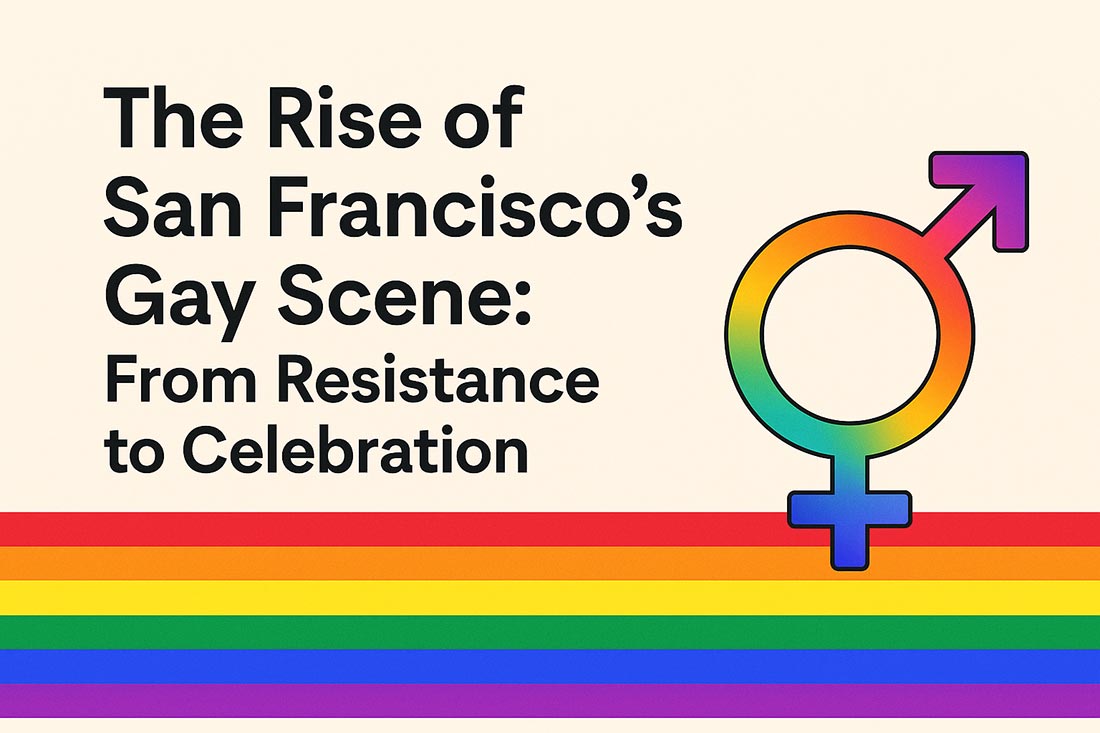circa 1852, New England
It was late autumn in a small New England town, the kind where the leaves painted every wooden porch with red and amber. The air was crisp, and the evenings came early, thick with chimney smoke and silence. Most homes kept their windows tightly shuttered — not just from the cold, but from the weight of eyes that always seemed to be watching.
In a modest room above the town’s aging tailor shop, Samuel and Elias sat near a fire that flickered against their worn books and hands touched by thread and ink. Theirs was a quiet life. Samuel, a schoolteacher with a gentle voice and an affection for poetry; Elias, a tailor who worked twelve hours a day with quick fingers and sharp eyes.
To the townspeople, they were simply housemates. Bachelors. Strange, maybe, but harmless. A man alone was pitiable — two men living together, well, that was practical. But to Samuel and Elias, the house on Walnut Street was a world of careful gazes, stolen moments, and dreams they dared only whisper after dark.
They had met in Boston, years ago, when Samuel was still studying classics and Elias was apprenticing at his uncle’s shop. A look across a narrow bookstall. A conversation that lingered too long. A night walk by the harbor that left them breathless for reasons they couldn’t say aloud.
When Elias followed Samuel to the countryside, they made it look accidental. A new job. An opportunity. But they both knew it was for survival — love could not live in plain sight.
By candlelight, Samuel would sometimes read Walt Whitman aloud, though the book was hidden in a false drawer, away from judging eyes and prying hands.
“We two boys together clinging,
One the other never leaving…”
Elias would close his eyes and listen, leaning back into the warmth of Samuel’s presence. A line of tension always ran between them — not because they doubted each other, but because the world left no room for them to be anything more than shadows.
“You ever wonder,” Samuel said one evening, “if there will come a time… when men like us won’t have to live this way?”
Elias didn’t answer at first. He stared at the fire, hands resting still in his lap. Then, softly, “I dream of it. But dreaming makes it harder to wake.”
Samuel nodded. “Still. I like to imagine it. Two men walking hand in hand down a street. Not looking over their shoulders. Dancing at a party, even. Telling people they’re in love.”
Elias gave a half-smile. “They’d call that witchcraft here.”
“Then may the future be full of witches.”
They laughed, a quiet, shared joy, the kind only people in hiding understand.
But the world had its eyes. There were neighbors who looked too long. A landlord who reminded them to “keep decent.” One winter, a boy at Samuel’s school whispered a cruel rumor. Though no one said it outright, the message was clear: Be careful. Be invisible.
And so they adjusted.
No lingering glances on the street. No visits from other like-minded souls — not after that one man from Providence was caught and jailed. Even the way they touched had changed: a hand on a shoulder instead of a kiss, a brush of fingers instead of a full embrace.
There were times when Elias wanted to leave. Head west. Start over. But Samuel always said the same thing: “Wherever we go, we take this silence with us.”
And Elias, who had never believed in paradise, stayed.
Years passed. Their hair grayed. The townspeople forgot their suspicions, or simply grew tired of wondering. “Old bachelors,” they said. “Odd fellows.” Children waved at them, and no one looked too closely anymore.
And then came a spring day, mild and quiet. Samuel had caught a fever that wouldn’t break, and Elias sat by his bedside with hands that trembled more from heartbreak than age.
“You remember,” Samuel whispered through cracked lips, “when we used to talk about the future?”
Elias nodded, swallowing hard.
“I think it’s coming, El.”
“What is?”
“That future we dreamed of. Maybe not for us. But for someone else. A boy, someday, who reads a book like this—” He gestured faintly toward his weathered Whitman — “and doesn’t have to hide it.”
Elias took his hand. “You always had hope.”
“I had you,” Samuel said. “And that was enough.”
Samuel passed quietly the next morning. Elias buried him under a birch tree behind the tailor shop. There was no cross, no headstone. Just a single carved line in the bark: S + E, and the year. It was enough for him.
Years later, when the town modernized and the buildings were leveled, someone found an old book wedged behind a loose floorboard: a copy of Leaves of Grass, underlined in places, a pressed violet between its pages. There was a note tucked inside.
For the boy who will not have to lie.
It took decades more, and the road was far from smooth. But over time, love did crawl out from behind curtains and closets. Men did walk hand in hand down streets. They danced at weddings. They kissed at train stations. They wrote their stories and didn’t have to hide them.
They didn’t know it, but they owed their quiet freedom to countless others like Samuel and Elias — men and women who endured the silence so that one day, others could speak loudly, proudly, and in the open.
Love, even when hidden, leaves behind echoes. Some stories aren’t told in history books, but they are written in the folds of time, waiting to be heard.






Leave a Reply